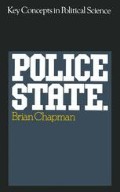Abstract
The common law countries stood outside of this process, and, indeed, they regarded the whole matter of ‘the police’ with the utmost suspicion. Radzinowicz has shown that the word itself entered the English language in the eighteenth century and it was for some time used in the wide European sense. Swift used it in this way, and Johnson defined it in his Dictionary as ‘the regulation and government of a city or country, so far as regards the inhabitants’. Burke used it in the sense of ‘policy’, and Pitt described emergency war legislation as a measure of ‘war police’. In Scotland, always more open to European influence, both senses of the word were employed as ‘a public police’, and Adam Smith defined it as ‘the second general division of jurisprudence … which properly signified the policy of civil government’, although he went on to add that ‘it now only means the regulation of the inferior parts of government, viz, the cleanliness, security and cheapness of plenty’1
Preview
Unable to display preview. Download preview PDF.
References
Radzinowicz, Introduction.
The original is in the McCord Museum, Quebec.
Author information
Authors and Affiliations
Copyright information
© 1970 Pall Mall Press Ltd, London
About this chapter
Cite this chapter
Chapman, B. (1970). New Meanings of the Term. In: Police State. Key Concepts in Political Science. Palgrave, London. https://doi.org/10.1007/978-1-349-00944-2_4
Download citation
DOI: https://doi.org/10.1007/978-1-349-00944-2_4
Publisher Name: Palgrave, London
Print ISBN: 978-0-333-11355-4
Online ISBN: 978-1-349-00944-2
eBook Packages: Palgrave Political & Intern. Studies CollectionPolitical Science and International Studies (R0)

